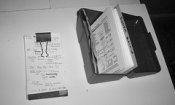Martin had an index card box, seldom visited. But he knew where it was. It was tan-brown, plastic, non-descript; what he kept in it was not index cards but clippings. Newspaper clippings, hardly larger than an inch square.
The most painful stories were the shortest ones. They dated back much farther than his occupation as a reporter. The box was seldom visited, seldom added to. But he knew exactly where it was every instance he had occasion to search it--no matter what apartment he lived in at the time.
The collection was small, smaller than he might have suspected it would become when he began it. Most were yellowed, some had support measures to retain the viability and readability of acid newsprint.
These were the worst stories. The worst things that happened to people that he knew of. Worse by far than what he could have anticipated, dreamed-up himself. Things that had happened. Things excruciating, painful to read, to contemplate having happened to human beings. Such as tortures inflicted upon infants, etc.
He knew where it was at all times. The box. Even if a year passed between instances of opening the box. But, as years went on, it took longer to put the loose clippings into the box. To physically maintain them until they reached the box. He was cognizant of having lost one or two, washed in pants pockets, fallen out of the car, the desk.
And there was one that took a notable amount of time to get in the box. One painful to even touch the paper. And now when he went back, he couldn't find it in the box. He knew he put it there. It had taken a further notable amount of time to get around to revisiting it.
It wasn't there. And he could not remember what it was. It was the worst story he had ever known of. And it was no longer reachable.
He was reasonably certain it was a story that had already happened.


